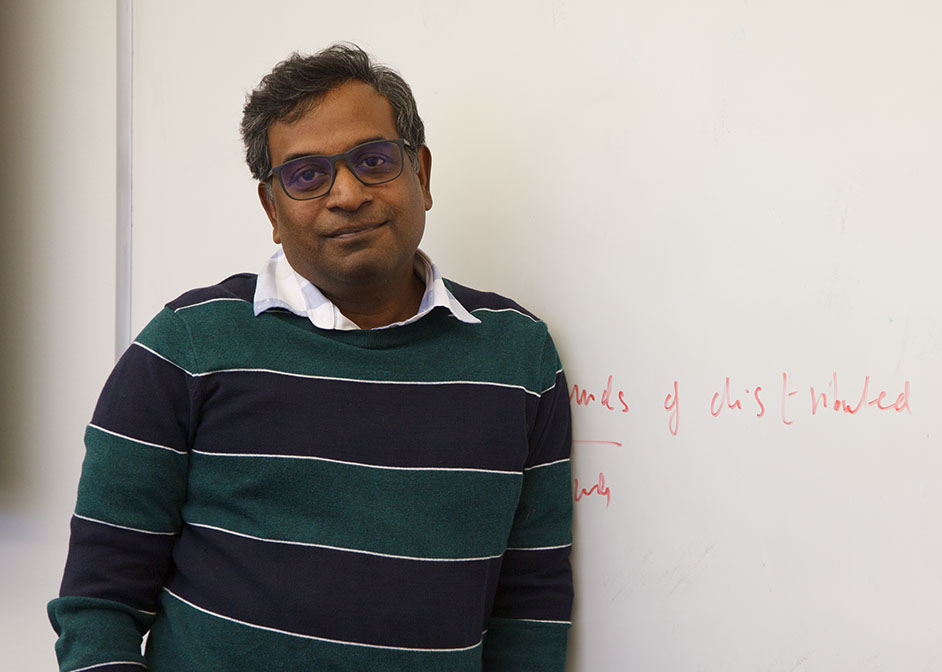Selection Underscores Significant Contributions to Their Areas of Research
Gopal Pandurangan and Ioannis Pavlidis, professors of computer science at the University of Houston and senior members of the Institute of Electrical and Electronics Engineers (IEEE), were elevated to the title of IEEE Fellow. Both are on the faculty at UH’s College of Natural Sciences and Mathematics.
Earning the distinction of IEEE Fellow is a prestigious accomplishment in the world of technology and engineering. It reflects not only the individual's significant contributions and ongoing impact, but also their institution's commitment to fostering a culture of innovation and excellence.
As part of IEEE, Pandurangan and Pavlidis help inspire a global community to innovate for a better future. They join a select group of individuals who have played pivotal roles in advancing science and technology across various disciplines.
Contributions to Distributed Computing and Computer Networking
Pandurangan, known for his groundbreaking work in algorithms and distributed computing, has demonstrated a consistent commitment to advancing the theoretical foundations of computer science. His research has not only expanded our understanding of fundamental algorithms but also has paved the way for practical applications in distributed systems, network protocols and data management.

His elevation to IEEE Fellow status cited him “for contributions to theory and algorithms for distributed computing and networks.” Pandurangan developed distributed protocols for efficient operation of peer to peer (P2P) computer networks. P2P networks emerged about 25 years ago and now take up a significant fraction of internet traffic.
“There have been several applications of P2P over the years, with blockchains and cryptocurrencies being the most recent major applications,” said Pandurangan. “P2P networks are highly dynamic and even maintaining connectivity in such a network is a challenging problem. Our research was the first major theoretical work to address this problem.”
Pandurangan also created a uniform theory to show lower bounds of distributed algorithms, giving insight into the complexity of accomplishing various fundamental distributed computing tasks.
“This research has provided a foundation for understanding a distributed network connected by next-generation computers, known as quantum computers,” said Pandurangan.
Affective Computing and Understanding Human Behavior
Pavlidis’ elevation to IEEE Fellow cited his “contributions to contact-free physiological measurements and affective computing.” Affective computing can recognize, interpret, process and simulate human emotions.

In the 2000s, Pavlidis was the first to conceive and develop contactless measurement methods for stress-induced instantaneous perspiration, breathing and pulsation. The methods were based on models driven by thermal facial imaging data.
These breakthroughs opened new possibilities for conducting naturalistic stress studies in affective computing as well as wellness studies in preventive medicine. Pavlidis’ methods found a wide range of applications, from detection of micro-stressors in everyday life to migraine monitoring.
“My methodology is not only unobtrusive, but also robust, because it quantifies stress through three physiological channels -- perspiration, breathing and pulsation,” said Pavlidis. “When all three channels point in the same direction, confidence on stress level estimation becomes unshakable.”
Pavlidis combined this new way of continuous physiological monitoring with automated extraction of contextual information, such as weather and activities, to account for the sources of the measured stress. This approach has brought unparalleled insights into behavioral studies, transforming the studies from limited stylized laboratory exercises to holistic real-world observations.
Using these transformative methods, Pavlidis and other researchers uncovered the way stress interferes with the acquisition of surgical skill, modeled the generative mechanism of stress during driving distractions, and documented the insidious effect of stress in knowledge work.
A Testament to Academic Excellence
To be elevated to Fellow status, an IEEE member must be nominated by a peer. The next step involves letters of recommendation from three to five IEEE Fellows who can provide testimony about a candidate’s contributions to their field of research and how they’ve made an impact.
Pandurangan and Pavlidis’ work has been featured in a number of highly respected scientific journals and top computer science conferences. Publications include the Journal of the Association for Computing Machinery and the journal Nature, and the IEEE Transactions on Affective Computing.
Conference proceedings featuring their work are the ACM’s Symposium on Theory of Computing and Symposium on Principles of Distributed Computing, the IEEE Symposium on Foundations of Computer Science, and Conference on Computer Vision and Pattern Recognition, the ACM-SIAM Symposium on Discrete Algorithms, and the CHI Conference on Human Factors in Computing Systems.
“Multiple faculty members from the same department earning this status with IEEE is a significant accomplishment not just personally, but it reflects highly on the university as well,” said Pandurangan.
- Chris Guillory, College of Natural Sciences and Mathematics